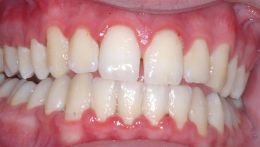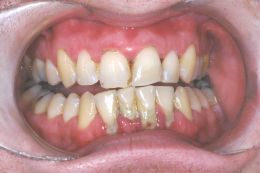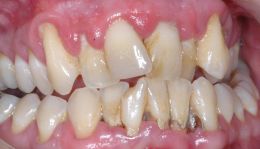What is gingivitis?
Gingivitis means inflammation of the gums. This is when the gums around the teeth become very red and swollen. Often the swollen gums bleed when they are brushed during cleaning.
What is periodontal disease?
Long-standing gingivitis can turn into periodontal disease. There are a number of types of periodontal disease and they all affect the tissues supporting the teeth. As the disease gets worse the bone anchoring the teeth in the jaw is lost, making the teeth loose. If this is not treated, the teeth may eventually fall out. In fact, more teeth are lost through periodontal disease than through tooth decay.
Am I likely to suffer from gum disease?
Probably. Most people suffer from some form of gum disease, and it is the major cause of tooth loss in adults. However, the disease develops very slowly in most people, and it can be slowed down to a rate that should allow you to keep most of your teeth for life.
What is the cause of gum disease?
All gum disease is caused by plaque. Plaque is a film of bacteria which forms on the surface of the teeth and gums every day. Many of the bacteria in plaque are completely harmless, but there are some that have been shown to be the main cause of gum disease. To prevent and treat gum disease, you need to make sure you remove all the plaque from your teeth every day. This is done by brushing and flossing.
How will smoking affect my gums and teeth?
Smoking can also lead to gum disease. Patients who smoke are more likely to produce bacterial plaque, which leads to gum disease. The gums are affected because smoking causes a lack of oxygen in the bloodstream, so the infected gums fail to heal. Smoking causes people to have more dental plaque and for gum disease to progress more rapidly than in non-smokers. Gum disease still remains the most common cause of tooth loss in adults.
What happens if gum disease is not treated?
Unfortunately, gum disease progresses painlessly on the whole so that you do not notice the damage it is doing. However, the bacteria are sometimes more active and this makes your gums sore. This can lead to gum abscesses, and pus may ooze from around the teeth. Over a number of years, the bone supporting the teeth can be lost. If the disease is left untreated for a long time, treatment can become more difficult.
How do I know if I have gum disease?
The first sign is blood on the toothbrush or in the rinsing water when you clean your teeth. Your gums may also bleed when you are eating, leaving a bad taste in your mouth. Your breath may also become unpleasant.
What do I do if I think I have gum disease?
The first thing to do is visit us for a thorough check-up of your teeth and gums. Your dentist can measure the ‘cuff’ of gum around each tooth to see if there is any sign that periodontal disease has started. X-rays may also be needed to see the amount of bone that has been lost. This assessment is very important, so the correct treatment can be prescribed for you.
What treatments are needed?
Your dentist will usually describe the required treatment to you in detail. You’ll also be shown how to remove plaque successfully yourself, cleaning all surfaces of your teeth thoroughly and effectively. This may take a number of sessions with our hygienist.
What else may be needed?
Once your teeth are clean, your dentist may decide to carry out further cleaning of the roots of the teeth, to make sure that the last pockets of bacteria are removed. This is known as root planing. You’ll probably need the treatment area to be numbed before anything is done. Afterwards, you may feel some discomfort for up to 48 hours.
Once I have had periodontal disease, can I get it again?
Yes, the disease can recur in the absence of oral hygiene, but as long as you keep up the home care you have been taught, any further loss of bone will be very slow and it may stop altogether. However, you must make sure you remove plaque every day, and go for regular check ups by the dentist and for maintenance visits that may be recommended to you by our hygienist.
Who is the hygienist?
Dental Hygienists are specially trained members of the Dental Team. They play an important role in dental health care, by helping prevent dental and gum disease, they also give individual oral hygiene instructions to the patient. Hygienists work closely with your dentist to establish and maintain a programme tailored to meet your specific needs and skills. Your hygienist will provide advice on effective cleaning and on diet. The hygienist is responsible for removing deposits of calcium, plaque and staining from the surfaces of the teeth.




